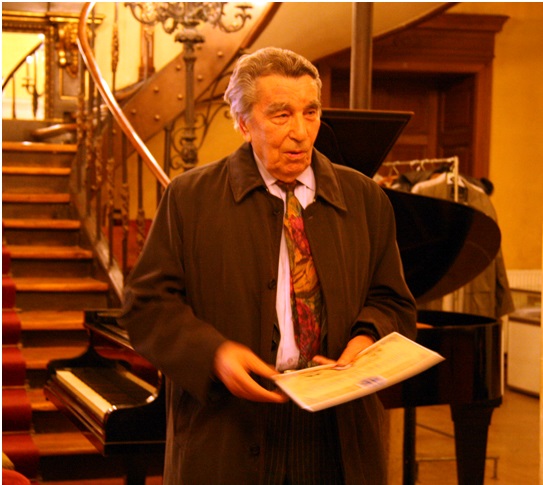Nicolae Lupan (1921–2017) was a Moldavian journalist, a high-ranking official of Moldavian State Television, a prominent dissident and, after his forced emigration in 1974, an employee of Radio Free Europe. He was born on 16 March 1921 in the village of Cepeleuți, in the county of Hotin, which at that time was part of the Romanian province of Bessarabia, later annexed in 1940 by the USSR. This village is currently in the Edineț district of the Republic of Moldova. The last of ten children, he attended school in the neighbouring village of Grinăuți, in Soroca, and then graduated from a high school in Cernăuţi. He then enrolled into the School of Reserve Non-Commissioned Officers in Botoşani, reaching the rank of sergeant major in the 30th Cavalry Regiment in Câmpulung Muscel. He initially fought against the Soviet army near Iași and then, after Romania switched sides in World War II, took part in military operations in Transylvania and Hungary. Eventually, he was removed from the front and forcibly “repatriated”. After the war, Lupan worked as a mathematics teacher in his native village. In 1961, he graduated from the Faculty of Letters at the University of Cernăuți. At the same time, he worked as a journalist in the regional newspaper Bucovina sovietică and as an editor at the regional radio station in Cernăuţi. Starting from 1958, he began collaborating with a number of journals and newspapers in Chișinău. He then moved permanently to the city, becoming an editor at the Luceafărul radio station. After the inauguration of Moldavian State Television, he moved there to become editor-in-chief at the Moldavian Radio, where he also presented the show Morning Star. He also had an intense and rich publishing activity. He was fired in 1970 for “spreading bourgeois Romanian nationalism and propagating Western culture.” More ominously, he was also accused of being a member of the “anti-Soviet” organisation National Patriotic Front. In March 1974, he was expelled with his family from the Soviet Union. He initially came to France and then settled in Belgium, where he acquired Belgian citizenship. There, in the early years, he earned his living as a factory worker, after which he continued his studies at the Free University of Brussels, receiving a degree in journalism (1978). Later, he was a teacher of Russian at a Belgian school. In 1987 he permanently moved with his family to Paris. Abroad, he engaged in systematic dissident activity, campaigning for Romania’s right to the territories occupied by the USSR. In 1975, he reorganised and became the leader of the émigré Pro Basarabia și Bucovina World Association (1975–2008), which claimed to have over 100,000 members representing Romanian exile communities from twenty-four countries around the world. Between 1974 and 1987, he collaborated with Radio Free Europe, where he had a weekly ten-minute show reporting news about the ”territory between the Prut and the Dniester.” He also wrote for some newspapers and magazines published in exile (e.g., for twenty years he had a column in the newspaper Cuvântul Românesc (Romanian Word) in Hamilton, Canada). Moreover, he founded and published two magazines, Basarabia și Bucovina and Întregirea și Reîntregirea (Unification and reunification). He also created the Nistru Publishing House, under whose aegis a series of books on the two Romanian provinces, Bessarabia and Bukovina, were published. He organised a number of conferences and public events concerning Bessarabia. He published several books, including: Plânsul Basarabiei (The weeping of Bessarabia, 1981); Pământuri românești: Schițe, studii și versuri (Romanian lands: Sketches, studies, and poems, 1984); Scrisoare fratelui meu (Letter to my brother, 1984); Imagini nistrene (Images from the Dniester, 2 volumes (1986–1990); Pământul Basarabiei (The land of Bessarabia, 1989); Însemnări de desțărat (Notes of an exile, 2001). He died on 25 January 2017, in Paris.

